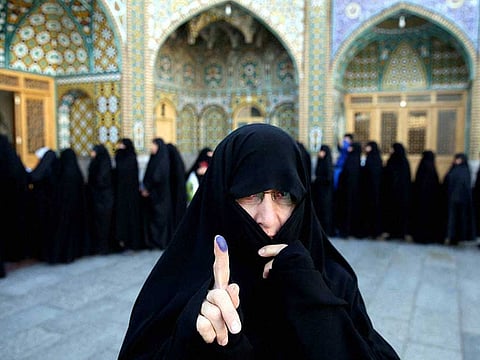Iran’s presidential elections no contest
The expected low turnout will show that Iranians aspire to a better system

Four decades after the revolution, Iran has yet to shed its revolutionary structure to become a state in the modern political sense. It is the ruling elite, mostly hardline clerics, that continues to hold tight control of the system, despite the claim that the Islamic republic is a democratic state.
Later this month, Iran holds a presidential election, the results of which many inside and outside the country believe are a foregone conclusion following the exclusion of many moderate candidates by the all-powerful Guardian Council. The seven approved candidates are conservative and close to the Supreme Leader, Ayatollah Ali Khamenei.
They include former nuclear negotiator Saeed Jalili, former Revolutionary Guards commander Mohsen Rezaee and the front-runner, the hardline judiciary chief Ebrahim Raisi. The two moderate candidates allowed to run are less known figures.
Iran’s elected president holds a sort of bureaucratic position, because the Supreme Leader Ali Khamenei, who runs the judiciary, security forces, media and foundations that control much of the economy, is the one with the final say in all things that matter- foreign and domestic policies. Thus, a majority of disenfranchised Iranians, who believe the next president has little power to impact major decisions, seem to have decided to boycott the polls.
Giving legitimacy to the regime
A recent poll by the Iranian Students Polling Agency (Ispa), close to the government, showed an expected turnout of just 36 per cent. The hashtag “No Way I Vote” is trending on Persian social media. Iranian leaders have always pushed for a big voter turnout to give legitimacy to the regime.
However, the ruling elite might have thought this time that even with the limited powers of the presidency and the expected meagre turnout, they cannot risk having another moderate figure in that position, taking into account the current internal and external circumstances.
Since the last presidential election in 2017, the United States pulled out of the nuclear deal and the economy suffered a double blow- the US sanctions and the coronavirus pandemic. Iran’s current economic crisis is the worst since the revolution with the inflation rate reaching 50 per cent.
In addition, as a result of Tehran’s hostile foreign policy and interference in Arab countries such as Yemen, Iraq, Lebanon and Syria, Iran’s relations with neighbouring Arab countries at their lowest point. With the election of Joe Biden as US president, Iran hopes that Washington would rejoin the nuclear deal and reconciliation talks with Arab Gulf neighbours are reportedly under way. The supreme leader wants to make sure that the next president will fall in line.
Iran has always tried to project a sort of democratic image; however this time and due to the emerging developments, the Supreme Leader seems to have decided it was not the time for even an appearance of a fair and transparent election. The expected low turnout will show that Iranians aspire to a better system, to a ‘normal’ state. Unfortunately for them, those who yield the power don’t subscribe to that idea.



